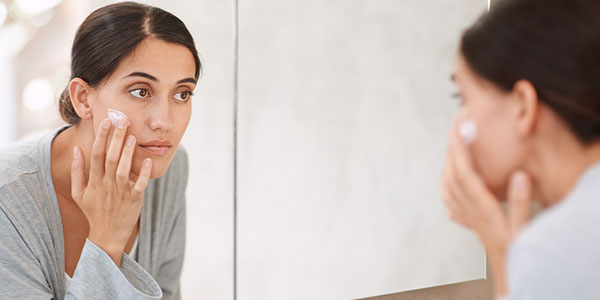How to Heal Adult Acne
Pimples, blackheads, whiteheads. Just when you thought you were through your awkward teenage years, they’ve come back — in the form of acne. “Adult acne is more common than most people think,” says Karen Han, M.D., Ph.D., a board-certified dermatologist at Sutter. “People can get acne into their 30, 40s and even 50s,” most often on the lower face and jawline.
Blame it on Hormones
Whatever your age, acne occurs when your body experiences rapid hormonal shifts. During adolescence, the teenage body begins producing hormones that cause the sebacious glands to overproduce sebum, the oil that’s released into pores to help lubricate the skin. Too much sebum creates oil pockets called microcysts.
That starts a cycle of dead skin cells clogging the oily pores and creating a larger cyst, which gets inflamed, creating a pimple. If you pick at it, the pimple ruptures, which can cause more inflammation and even scarring.
During adult transitions, such as pregnancy or perimenopause, a similar skin response occurs. “During certain periods in your life, your hormones shift rapidly,” Dr. Han explains. “At 12 your body’s trying to catch up with all the change brought on by puberty. At 50, it’s trying to catch up to perimenopause.”
A Three-Pronged Strategy
“Acne comes and goes, so people usually seek treatment based on their level of frustration,” Dr. Han says. “Some people can have 10 pimples on their face and they don’t care, while others come in with tiny whiteheads and want help.”
Adult acne treatment typically involves a three-pronged strategy: address oil production, control inflammation and (for severe cases) deal with the body’s hormone levels.
Controlling your skin’s oil production works in stages. Your doctor will advise you to use only non-comedogenic (non-pore-blocking), oil-free cosmetics. For mild acne, you’ll start with an over-the-counter drying agent, like a salicylic acid face wash, to reduce oil production and unblock pores. If you need more help, a doctor might prescribe a topical prescription medication, such as tretinoin or adapalene. Finally, you might benefit from an oral medication, like isotretinoin.

To reduce inflammation, treatment varies from person to person. Some people have mild inflammation, while others develop larger pimples. For mild cases, use over-the-counter agents, like benzoyl peroxide or azelaic acid. If you have larger pimples, your doctor may prescribe a topical antibiotic, such as clindamycin, for its anti-inflammation (rather than antibacterial) purposes. Finally, to avoid scarring of larger pimples, doctors might suggest stronger oral antibiotics, like oral tetracycline, oral doxycycline and minocycline.
If you’re a woman with severe acne, talk to your doctor about treatments that offer more hormonal control, including oral contraception or prescription medications such as spironolactone, which limit hormonal fluctuations. “These can clear you up,” Dr. Han says, “but there are a lot of side effects.”
Customize Your Approach
Rather than treating oil production, inflammation and hormonal shifts in isolation, “we often attack all three categories at once,” Dr. Han says. “You could be on a topical medication for oil control and an oral medicine for inflammation. We require that patients who take oral contraceptives also use isotretinoin for oil control. Acne is multifactorial, and if you only control one component, it may not be sufficient.”
Adult-onset acne causes understandable distress, so work with your doctor to determine the cause of your breakouts and help you devise a plan to manage it. “How aggressive we treat your acne depends on how aggressive you want to be,” Dr. Han says. “We can clear your skin, but sometimes it takes time and effort.”
Healthy Skin at Every Age
From acne to aging, our dermatology teams provide high-quality care to help your skin look and feel its best.




